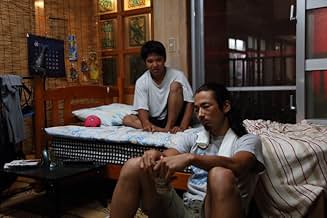ÉVALUATION IMDb
7,0/10
3,6 k
MA NOTE
Un effroyable meurtre non résolu relie trois histoires en apparence sans lien entre elles dans trois villes japonaises différentes.Un effroyable meurtre non résolu relie trois histoires en apparence sans lien entre elles dans trois villes japonaises différentes.Un effroyable meurtre non résolu relie trois histoires en apparence sans lien entre elles dans trois villes japonaises différentes.
- Prix
- 4 victoires et 21 nominations au total
Avis en vedette
This film begins with a gruesome murder scene, where a man and a woman are found dead in their home. The police traces who the killer is by thumbprints, and the killer's photo is all over the news. Three fugitives' lives, who look like the killer in the photo, are told in the film.
I bought the cinema ticket without knowing what the film was about. And wow, I was blown away by it. I did not expect the story to be so gripping and engaging. Though there are a lot of characters, they are all properly introduced, so that there is no confusion as to who is who. The identity of the killer is kept a secret throughout until the very end, which makes the film suspenseful. I am also positively surprised by the major subplot of two homosexual characters, with a few explicit scenes that I do not normally associate with Japanese films. Furthermore, emotions are very well portrayed in the film, including love, trust, mistrust and very heavy guilt. There are so many heartbreaking scenes that exposes the characters' hurt and deep sadness, making "Ikari" a film to watch and feel. I enjoyed the experience thoroughly.
I bought the cinema ticket without knowing what the film was about. And wow, I was blown away by it. I did not expect the story to be so gripping and engaging. Though there are a lot of characters, they are all properly introduced, so that there is no confusion as to who is who. The identity of the killer is kept a secret throughout until the very end, which makes the film suspenseful. I am also positively surprised by the major subplot of two homosexual characters, with a few explicit scenes that I do not normally associate with Japanese films. Furthermore, emotions are very well portrayed in the film, including love, trust, mistrust and very heavy guilt. There are so many heartbreaking scenes that exposes the characters' hurt and deep sadness, making "Ikari" a film to watch and feel. I enjoyed the experience thoroughly.
RAGE is the second attempt of Lee Sang-il, a Japanese filmmaker of Korean extraction, at adapting Shûichi Yoshida's popular novels, the first being VILLAIN (2010), a critical succès d'estime, both films ostensibly inspect the malaise of a contemporary society built upon a lurid murder case.
A couple is cold-bloodedly liquidated in their home, one year later, three strands (taking place in Chiba, Tokyo, and Okinawa respectively) of narratives are cogently intersected when the police corroborate that the suspect has undergone a facelift and is on the lam, all three story lines will be boiled down to a disintegration between the initially unsuspected and the possible perpetrator, and at the same time, the film meticulously keeps dangling audience with its ever-rotating guessing game.
In Chiba, a girl Aiko (Miyazaki) sloughed from a demimonde background by her father Yohei (Watanabe), strikes a relationship with Tetsuya (Matsuyama), a reticent young man with his past concealed; in Tokyo, a self-dependent gay man Yuma (Tsumabuki), lays his eyes on a reedy Naoto (Ayano) in his usual cruising haunt, after their first penetration, Yuma invites a homeless Naoto to live with him, but the latter remains unforthcoming to a fault; in Okinawa, drifter Shingo Tanaka (Moriyama) is hidden on a small island, after chancing upon a newly-arrived young girl Izumi (Hirose) and a local boy Tatsuya (Sakumoto), their fate will go through shifting sands when an unfortunate tragedy occurs.
Thus, Lee plies audience with 3 candidates of the murderer: Tetsuya, Naoto and Shingo, and cunningly teases viewers with alternate possibilities by dint of coalescing these three's attributes into one photoshopped end product (only one revealing shot in the elevator brazenly belies the eventually misled whodunit), actually, the film is not so much a police procedural as a carefully designed weepie gauging the tenuous degree of trust among human interactions, at least in the paralleled stories of Chiba and Tokyo, the issue of trusting the one you love in spite of his carapace hammers home in a treacly manner albeit two terrific performances from Miyazaki and Tsumabuki, the former blends convincingly her unadulterated immaturity with searing vulnerability whereas the latter, palpably inputs something warm, sympathetic and enthralling to flesh out a character very easily teetering on the brink of homosexual platitude. On the other hand, a transcendent Moriyama steals the limelight in the Okinawa chapter, where the film thrusts its "rage" mythos to the fore and reveals something rotten entrenched within (a slap to both islanders and foreigners), but newcomer Takara Sakumoto is unfortunate shy of charisma to match his rival here.
As a matter of fact, acting is the movie's strongest suit because the script itself takes liberty with many wanton coincidences and artistic license to facilitate plot progress, for example, is it really necessary to bluntly play up certain characters' taciturnity as if this is the only way to keep audience hooked without spilling the beans? Also, for my money, the movie errs on the side of being mawkish and blasé, other than taking its aim at a more rapier-like appraisal of its intriguing premise (cause of the crime), Lee's film is awash with sizzling emotions (cheek by jowl with Ryuichi Sakamoto's attendant score) but in the end of the day, it doesn't reach the echelon of superiority as far as the ultimate impact is concerned.
A couple is cold-bloodedly liquidated in their home, one year later, three strands (taking place in Chiba, Tokyo, and Okinawa respectively) of narratives are cogently intersected when the police corroborate that the suspect has undergone a facelift and is on the lam, all three story lines will be boiled down to a disintegration between the initially unsuspected and the possible perpetrator, and at the same time, the film meticulously keeps dangling audience with its ever-rotating guessing game.
In Chiba, a girl Aiko (Miyazaki) sloughed from a demimonde background by her father Yohei (Watanabe), strikes a relationship with Tetsuya (Matsuyama), a reticent young man with his past concealed; in Tokyo, a self-dependent gay man Yuma (Tsumabuki), lays his eyes on a reedy Naoto (Ayano) in his usual cruising haunt, after their first penetration, Yuma invites a homeless Naoto to live with him, but the latter remains unforthcoming to a fault; in Okinawa, drifter Shingo Tanaka (Moriyama) is hidden on a small island, after chancing upon a newly-arrived young girl Izumi (Hirose) and a local boy Tatsuya (Sakumoto), their fate will go through shifting sands when an unfortunate tragedy occurs.
Thus, Lee plies audience with 3 candidates of the murderer: Tetsuya, Naoto and Shingo, and cunningly teases viewers with alternate possibilities by dint of coalescing these three's attributes into one photoshopped end product (only one revealing shot in the elevator brazenly belies the eventually misled whodunit), actually, the film is not so much a police procedural as a carefully designed weepie gauging the tenuous degree of trust among human interactions, at least in the paralleled stories of Chiba and Tokyo, the issue of trusting the one you love in spite of his carapace hammers home in a treacly manner albeit two terrific performances from Miyazaki and Tsumabuki, the former blends convincingly her unadulterated immaturity with searing vulnerability whereas the latter, palpably inputs something warm, sympathetic and enthralling to flesh out a character very easily teetering on the brink of homosexual platitude. On the other hand, a transcendent Moriyama steals the limelight in the Okinawa chapter, where the film thrusts its "rage" mythos to the fore and reveals something rotten entrenched within (a slap to both islanders and foreigners), but newcomer Takara Sakumoto is unfortunate shy of charisma to match his rival here.
As a matter of fact, acting is the movie's strongest suit because the script itself takes liberty with many wanton coincidences and artistic license to facilitate plot progress, for example, is it really necessary to bluntly play up certain characters' taciturnity as if this is the only way to keep audience hooked without spilling the beans? Also, for my money, the movie errs on the side of being mawkish and blasé, other than taking its aim at a more rapier-like appraisal of its intriguing premise (cause of the crime), Lee's film is awash with sizzling emotions (cheek by jowl with Ryuichi Sakamoto's attendant score) but in the end of the day, it doesn't reach the echelon of superiority as far as the ultimate impact is concerned.
Great Movie (be aware of some scenes might be very disturbing) that does not hold back any punches. You will be angry, sad, happy and disturbed.
Amazing acting, the movie will keep you guessing and questioning yourself. Its a detective movie and multiple love story at the same time. Movie takes place in 3 different Japanese cities with beautiful cinematography. As you sit on the edge of your seat you wonder about the different scenarios that someone faces in life and how you would react to it.
Truly enjoyable, a movie that you need to dedicate your time to it to understand it. Love it..
Amazing acting, the movie will keep you guessing and questioning yourself. Its a detective movie and multiple love story at the same time. Movie takes place in 3 different Japanese cities with beautiful cinematography. As you sit on the edge of your seat you wonder about the different scenarios that someone faces in life and how you would react to it.
Truly enjoyable, a movie that you need to dedicate your time to it to understand it. Love it..
It's a very emotional movie which touches on a few rather uncomfortable, unpleasant and tragic real life subjects. The acting is really good. Unfortunately the plot writing is a bit of a weak point. It's not very creative or believable. Also, some of the protagonists' reactions to the events taking place don't make much sense in terms of realism and only seem to serve for increasing dramatic effect.
This Japanese mystery/drama is made up of three concurrent stories centring on enigmatic strangers who enter the orbits of trusting individuals from different Japanese cities, while a grim double-murder investigation plays out in the background. In Chiba, an ex sex worker forms a relationship with a taciturn young man whom her father is wary of, a confident gay man begins a relationship with a quiet and mysterious man he met in a seedy joint in downtown Tokyo and a young lady newly arrived in Okinawa befriends a drifter who lives alone on a nearby island.
I must say that I found this film to be pretty riveting from start to finish. The detective strand of the story takes a bit of a back-seat while the three main plot strands propel forwards. But the whodunit aspect remains extremely compelling and I was gripped to the end. The various stories all play off feelings of trust/mistrust in regard to how the trio of strangers are perceived and treated by the people they come into contact with. The acting by the ensemble cast is very strong throughout and the different dramas all have a strong dramatic punch to them. The film is pleasingly unpredictable and it really is difficult working out how it is going to play out, which is of course a big bonus for a mystery movie, but while the ending was satisfying it might have been slightly less than the journey getting there. This is a fairly minor complaint as this as a whole is a very strong bit of Japanese cinema. Be warned though, there is one extremely harrowing scene mid-way through the picture which was hell of a difficult to watch and very emotionally tough indeed. A couple of folks at the screening I attended walked out at this point in actual fact, I won't say any more as its best to go into this with no prior knowledge as it is a key scene. So, it is a film which is definitely tough in places. It is a very impressive bit of work though, with strong dramatics underpinned by a compelling mystery framework and it is well worth seeing if you can take films with disturbing content.
I must say that I found this film to be pretty riveting from start to finish. The detective strand of the story takes a bit of a back-seat while the three main plot strands propel forwards. But the whodunit aspect remains extremely compelling and I was gripped to the end. The various stories all play off feelings of trust/mistrust in regard to how the trio of strangers are perceived and treated by the people they come into contact with. The acting by the ensemble cast is very strong throughout and the different dramas all have a strong dramatic punch to them. The film is pleasingly unpredictable and it really is difficult working out how it is going to play out, which is of course a big bonus for a mystery movie, but while the ending was satisfying it might have been slightly less than the journey getting there. This is a fairly minor complaint as this as a whole is a very strong bit of Japanese cinema. Be warned though, there is one extremely harrowing scene mid-way through the picture which was hell of a difficult to watch and very emotionally tough indeed. A couple of folks at the screening I attended walked out at this point in actual fact, I won't say any more as its best to go into this with no prior knowledge as it is a key scene. So, it is a film which is definitely tough in places. It is a very impressive bit of work though, with strong dramatics underpinned by a compelling mystery framework and it is well worth seeing if you can take films with disturbing content.
Le saviez-vous
- Bandes originalesM21 Forgiveness
Written by Ryuichi Sakamoto
Performed by Ryuichi Sakamoto feat. 2Cellos
Courtesy of Sony Music Japan International
Meilleurs choix
Connectez-vous pour évaluer et surveiller les recommandations personnalisées
- How long is Rage?Propulsé par Alexa
Détails
Box-office
- Brut – à l'échelle mondiale
- 13 521 593 $ US
- Durée2 heures 22 minutes
- Couleur
- Mixage
- Rapport de forme
- 2.35 : 1
Contribuer à cette page
Suggérer une modification ou ajouter du contenu manquant





























